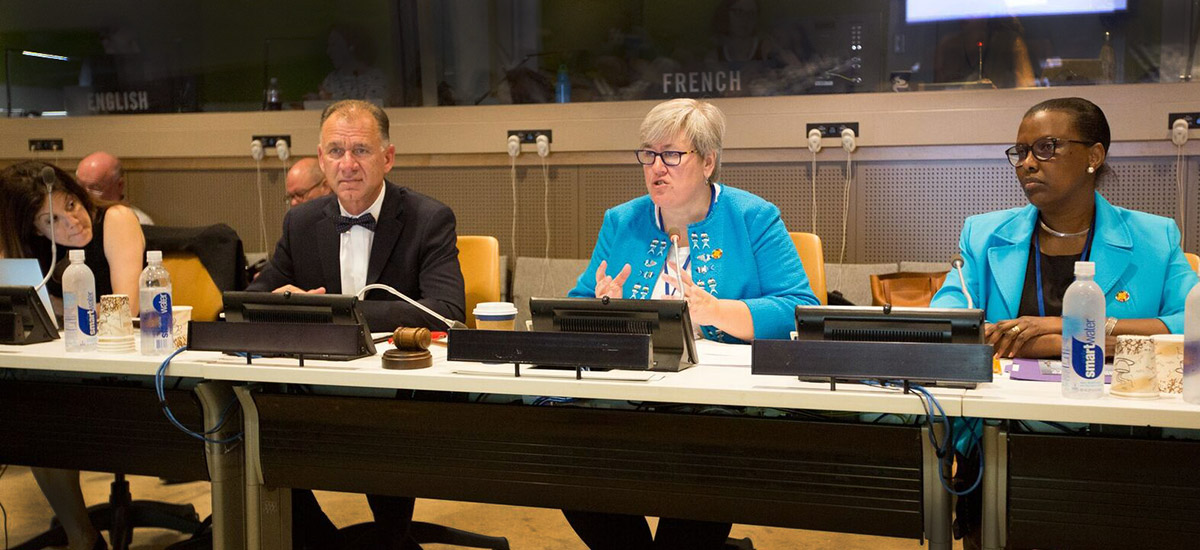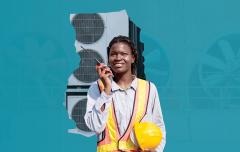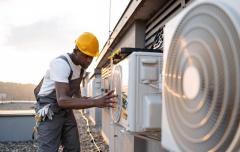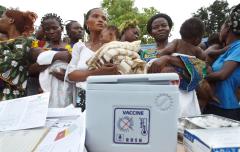Global Cooling Access Gap Takes Center Stage at UN High-Level Political Forum
NEW YORK CITY – On the same day that extreme heatwaves were hitting numerous parts of the world, Sustainable Energy for All (SEforALL) launched a new report at the UN on the emerging global challenge of providing sustainable cooling solutions for all in a warming world.
The event, held for the launch of Chilling Prospects: Providing Sustainable Cooling for All, took place during the UN High-Level Political Forum (HLPF), and bought together government ministers and a panel of global experts from the Cooling for All initiative to discuss the new research and possible solutions to increase access. The event was co-sponsored by the governments of Rwanda, the Marshall Islands and United Arab Emirates.
The Chilling Prospects report, produced in partnership with the Kigali Cooling Efficiency Program (K-CEP), is the first to explore how access to cooling determines people’s life chances, health outcomes and overall productivity. It also assesses the vast economic opportunities of the global cooling challenge and the imperative of providing sustainable cooling solutions that protect the climate.
“We’ve tried to look at cooling from a human perspective, what it means to people,” said Rachel Kyte, CEO and Special Representative to the United Nations Secretary-General for Sustainable Energy for All, in launching the report to a packed UN conference room. “If you don’t have access to electricity, if you don’t have access to cooling, a lot is in jeopardy, not only for life and well-being, but for economic opportunities.”
Valentine Rugwabiza, Permanent Representative of Rwanda to the UN, echoed the point, saying, “Cooling cannot be considered to be a luxury. It is an essential path for productivity, efficiency and also for safety.” Pointing to recent record high temperatures this month in Tunisia, she also stressed the importance of sustainable cooling strategies that do not worsen climate impacts.
Chilling Prospects shows that over 1.1 billion people globally face immediate risks from lack of access to cooling, including:
- 470 million people in poor rural areas without access to safe food and medicines due to a lack of electricity and refrigeration;
- 630 million people in hotter, poor urban slums with little or no access to cooling to protect them due to unavailable, intermittent or too expensive electricity.
Industry opportunity
The report also identifies another significant population that represent a different kind of cooling risk – specifically, 2.3 billion people in the growing middle class in developing countries who are on the brink of buying the most affordable and less efficient cooling devices, which could spike global energy demand with profound climate impacts.
Yet the Chilling Prospects research clearly shows another important message: the cooling challenge offers businesses and entrepreneurs an enormous opportunity of major new consumer markets which want super-efficient, affordable technologies to meet their cooling needs. This includes deploying the most efficient current technologies, as well as developing new, innovative efficient solutions, for those most in need of cooling – or as some called it, the “gold chain” at the bottom of the pyramid.
“Industry has proven we can meet the technological challenges. We need to act today, and the good news is that we have proven available solutions to do so,” said John Galyen, President of Danfoss North America, an industry leader on cooling solutions.
 Left to right: Christine Egan, Chief Executive Officer, CLASP, John Galyen, President of Danfoss North America, Rachel Kyte, CEO and Special Representative to the United Nations Secretary-General for Sustainable Energy for All, Valentine Rugwabiza, Permanent Representative of Rwanda to the United Nations
Left to right: Christine Egan, Chief Executive Officer, CLASP, John Galyen, President of Danfoss North America, Rachel Kyte, CEO and Special Representative to the United Nations Secretary-General for Sustainable Energy for All, Valentine Rugwabiza, Permanent Representative of Rwanda to the United NationsCountry action
During the launch event, government leaders, businesses, entrepreneurs and NGOs shared stories of simple and not-so-simple cooling measures that are improving people’s lives across many of the Sustainable Development Goals.
Many of the cooling gains are happening in regions that face the biggest cooling access risks. Among the 52 most vulnerable countries evaluated in the report, India, Bangladesh and Nigeria had the largest rural populations facing health and food security risks due to a lack of refrigeration. India, China and Nigeria and Brazil had the biggest urban slum populations facing cooling risks.
Danfoss discussed how it is helping India’s banana growers to optimize cold chain strategies, enabling them to more than double their incomes and open trade in Europe for the first time. Ecozen Solutions, a 2018 Ashden Awards winner, has developed a solar-powered cold room that is helping India’s rural farmers to maximize the shelf life for vegetables and flowers, thus boosting sales revenues. “We think there’s huge potential,” said Ecozen Solutions Co-Founder Vivek Pandey, speaking at a Seven for 7 event in hosted by SEforALL and Ashden to celebrate SDG7 leadership during the HLPF.
Other stories came from East Africa and the Marshall Islands, who told of affordable cold storage solutions transforming lives for remote rural farmers and fishing enclaves. “Many times the extra income that is realized by reaching remote rural markets (with cooling) can be the difference between sending a child to school or not,” said Deborah Barker-Manase, Deputy Permanent Representative of the Marshall Islands to the UN.
Other cooling solutions are simple to implement such as applying reflective paint on top of urban buildings to mitigate extreme heat. “It’s an ancient technology that can be deployed immediately,” said Kurt Shickman, Executive Director of the Global Cool Cities Alliance. He noted that in India, urban buildings with cool roofs are 3 to 3.5 degrees cooler inside compared to buildings with no reflective materials. “That can be the difference between life and death on a really hot day.”
Scaling Solutions
But these examples are only initial steps in delivering affordable and efficient cooling for all.
The discussion focused on key steps for catalyzing faster, broader action, including public/private partnerships, strong industry engagement, more development finance and government leadership.
Kyte praised India and Rwanda for promoting national cooling strategies and she encouraged other countries to join them and reap the benefits from being able to provide sustainable cooling in their countries.
Three historic international agreements are providing important momentum – the 2030 Sustainable Development Goals, the Paris Climate Agreement and the Montreal Protocol’s Kigali Amendment, which aims to cut global warming refrigerants, known as hydrofluorocarbons (HFCs), by 80 percent over the next 30 years. The Kigali Amendment is an especially important opportunity given the soaring global demand for energy-intensive cooling appliances such as air conditioners.
Rwanda’s ambassador said it would be helpful if more countries would ratify the Kigali Amendment, beyond the 40 that have done so to date. “Universal ratification would send an important message to industry that this is where they should be putting their R&D,” she said.
Partnerships supporting action
Business and philanthropic leaders expressed confidence we can meet the challenge of providing affordable and efficient cooling for all, and do so in a way that does not increase energy demand and climate change.
Charlotte Pera, President of the ClimateWorks Foundation, a key funder of the Kigali Cooling Efficiency Program (K-CEP), said: “It’s really inspiring to see the potential for efficient clean cooling that not only provides climate benefits, but also to help ensure ample food supplies, help raise incomes for farmers, help get vaccines and medicines to markets where people need them and help achieve greater productivity and comfort and reduce heat-related deaths in the world’s hot spots that are, of course, only getting hotter.”
Pera announced that K-CEP, a philanthropic collaboration focused on tackling cooling-related pollution, is committing $5 million to support recommendations highlighted in the report. The principal aim is to spur wider interest and action by governments, businesses and policymakers on cooling needs. K-CEP will focus support on medical supply chains, especially vaccines, cool roofs and food cold chains, as well as support to train policymakers. Through a partnership with SEforALL, it will also continue raising awareness about the importance of efficient, clean cooling and the need for action.
To find out more about the report here, and follow the conversation online using #CoolingforAll.




